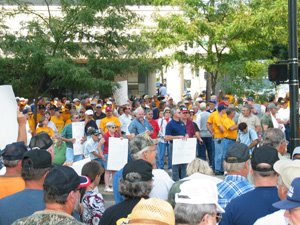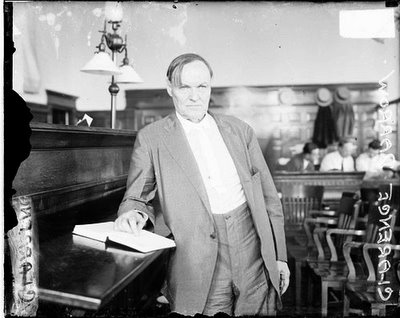 Eminent Domain Virginia Style
Eminent Domain Virginia Style
Should Citizens Fear their Local Government?
Case Study: Cumberland County Kangaroo CourtWho ever said that “all politics is local” sure hit the old nail right on the head!
This past year, readers might vaguely remember the buzz about the decision of the United States Supreme Court in a case referred to as Kelo vs. New London. To listen to civil libertarians talk, this decision was tantamount to the collapse of Western civilization and a giant step towards totalitarianism in America.
To the average person, Kelo wasn’t really seen as all that relevant to those core issues that we as Americans are duty-bound to fight to the death over… you know… freedom of speech, abortion, the right to keep and bear arms, abortion, and… did I mention abortion?
Kelo was about extending the concept of “Eminent Domain” to applications never before seen, at least in America. Hell, the term Eminent Domain isn’t even an American term as far as I can see. It is a legal term going back to the Old World and at least as far back as 1730. Before that time, kings and other assorted potentates could do pretty much as they pleased anyway so they had no need for a fancy legal term like Eminent Domain.
The concept of Eminent Domain, in a nut shell, means that the government, federal, state or local, has the superior right of sovereignty to take your land. Normally, to do so, the government needs to have appropriate public interest justification. Also, Eminent Domain presumes “fair compensation” for the parties giving up their property.
But the Kelo decision is significant in that it effectively broadens the public interest justification for Eminent Domain to include economic reasons. It is in this realm that the entire concept of public interest justification and fair compensation gets very blurry and… very scary. From the Kelo decision, citizens now have a good reason to be fearful of local governments across America and across the Commonwealth.
The fact is, Kelo, while not having the “hot button” appeal as some other issues (abortion for example) turns out to be a pretty darned scary Supreme Court precedent and one that has already come home to roost right here in our own beloved Commonwealth and even in our littlest and most tranquil communities. For example: Cumberland County.
What may be one of the most egregious abuses of the concept of Eminent Domain since the U.S. Supreme Court decided Kelo vs. New London this past year may be the case soon to be known as Meeks vs. Cumberland County.
The facts of the case as we understand them from the Richmond Times Dispatch are as follows. About three years ago, Cumberland County elected to auction off the Luther P. Jackson Elementary School and grounds. No doubt, the property had been idle and neglected for a number of years. Like so many other old school facilities, the Jackson School probably had a long and productive service life but finally out-lived its functional usefulness. Renovating old buildings is expensive and often not as cost effective as building new. The County did what many other communities have opted to do. They sold the old school building at public auction.
A bidder acquired the old school building and 20 acres of land for $110,000. The buyer was a Farmville area realtor, one Mary Meeks and her husband. According to news reports, after the property was acquired, Ms. Meeks mortgaged the property to get a $250,000 loan and spent about $400,000 towards fixing up the facilities. The facility is presently being used for a variety of commercial and community activities.
So far, so good.
But now, lo and behold, the County wants the building and grounds back and they want to use it for…guess what… educational facilities.
Cumberland County might have planned ahead and considered their future needs before unloading the old school for what appears to be a very modest financial gain, thus avoiding this entire problem. But, that is another story for another time. We are concerned here about the fate of the Western civilization and the frightening trend towards an American totalitarianism.
The real problem is not about second guessing the judgment of Cumberland County officials who made the original mistake by auctioning off the property. The real problem rests with the current Cumberland County officials who are abusing private property rights through a heavy handed and inappropriate application of Eminent Domain.
After deciding that they wanted the property back, the County did not waste any time with negotiations or other niceties. They started off with an ultimatum that the County intended to condemn the property and that they would pay Ms. Meeks the sum of $200,000, notwithstanding the mortgage, other investments, or Ms. Meek's trouble in trying to redevelop the property. Apparently this sum was based on the
County’s estimate of the property’s worth and
not the owner's estimate.
Nor was this a hollow threat. Cumberland County fulfilled its threat by filing a condemnation suit and a certificate of taking against the property and deposited their $200,000 check with the Circuit Court in Cumberland County. Underscoring this heavy handedness, County officials showed up in person this past week to officially declare ownership of the property.
Indeed, $200,000 is more than the Ms. Meeks paid for the property, but according to news accounts, this amount is far short of her total investments in the property and the mortgage. So in effect, the County wants the current owner, Ms. Meeks an her husband, to “eat” whatever losses they may incur in the interest of bailing out Cumberland County for its lack of foresight.
The Iconoclast appreciates that the underlying intentions of the County may be to address a legitimate need for school space that was not planned for… honorable enough but misguided. Cumberland County’s failure to plan ahead is not sufficient justification for abusing the rights of private property owners.
The Iconoclast also understands that the concept of Eminent Domain is valid and may be appropriately applied to certain public needs when justified and when property owners are fairly compensated. But bailing the County out for bad decision making hardly rises to this standard.
In the end, this case study about the misapplication of Eminent Domain in Cumberland County is probably all the Virginia General Assembly needs to understand that the taking of private property for public use must be exercised sparingly, for unquestionably critical and legitimate public purposes, and by fair due process.
Ms. Meeks is quoted as saying: “I’ll take it all the way to the Supreme Court.” Presumably she means the same U.S. Supreme Court that handed down the decision on Kelo vs. New London just last year thus opening the door wide to such abuses in the first place.
Now it is up to the Virginia General Assembly slam the door shut on this scary trend of abusing the concept of Eminent Domain before too many local officials acquire a taste for totalitarianism.











